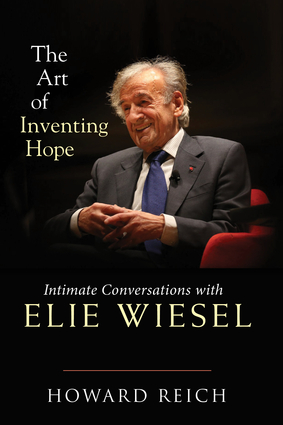Overview
The Art of Inventing Hope offers an unprecedented, in-depth conversation between the world’s most revered Holocaust survivor, Elie Wiesel, and a son of survivors, Howard Reich. During the last four years of Wiesel’s life, he met frequently with Reich in New York, Chicago and Florida—and spoke often on the phone—to discuss the subject that linked them: both Wiesel and Reich’s father, Robert Reich, were liberated from Buchenwald death camp on April 11, 1945. What had started as an interview assignment from the Chicago Tribune quickly evolved into a friendship and a partnership. Reich and Wiesel believed their colloquy represented a unique exchange between two generations deeply affected by a cataclysmic event. Wiesel said to Reich, “I’ve never done anything like this before.” Here Wiesel—at the end of his life—looks back on his ideas and writings on the Holocaust, synthesizing them in his conversations with Reich. The insights that Wiesel offered and Reich illuminates can help the children and grandchildren of Holocaust survivors understand their painful inheritance, while inviting everyone else to partake of Wiesel’s wisdom on life, ethics and morality.
Reviews
"Howard Reich utilizes his considerable journalistic talents and unique perspective as a second-generation Holocaust survivor to elicit powerful insights from Elie Wiesel. This book will play an important role in making the Holocaust relevant to future generations.” —Marion Blumenthal Lazan, coauthor of Four Perfect Pebbles
“In his struggle to understand his parents’ unimaginable and unspoken past, Howard Reich finds answers in these powerful conversations with Elie Wiesel....Reich’s own poignant narrative is as compelling as the advice Wiesel offers, and in the end it is so satisfying to see how these two brilliant minds find solace through words and through love.” —Mary Morris, author of Gateway to the Moon and The River Queen
“How does one survive the horrors of the Holocaust? Wiesel helps Reich to discover that in shared memory there is hope.” —Sheila Nevins, television producer and author of You Don't Look Your Age...And Other Fairy Tales
“Through his compelling, fascinating and poignant conversations with Elie Wiesel, Howard Reich shares his quest for a deeper understanding of the Holocaust and of the way mankind’s darkest days shaped the lives of his survivor parents and ultimately his own. Reich does a masterful job of weaving his probing questions and the Nobel Laureate’s insightful answers into a tapestry of Jewish identity and morality. This extremely personal and, at times, emotional book...makes clear that descendants, like Reich, of Holocaust survivors are now becoming the witnesses who carry the banner that declares one must never give up or give in to apathy and evil.” —Allan Zullo, author of the Haunted Kids and Ten True Tales series
“Howard Reich’s father and Elie Wiesel shared the unforgettable experience of being liberated from a Nazi concentration camp on the same day in 1945. Bridging generations, this exceptionally thoughtful series of conversations gives the reader a deeper understanding of the meaning of the Holocaust.” —Newton N. Minow, former chair of the Federal Communications Commission and author of Inside the Presidential Debates
"Reich does an admirable job of complementing his subject's sage words with his own perspective without in any way detracting or distracting from it--no easy task yet one the author accomplishes with aplomb." --Kirkus Reviews
"Irreplaceable thoughts from a vanishing generation." --Kirkus Reviews
"In Wiesel's words, 'To hear a witness is to become a witness.' Anyone who reads Reich's book will become a witness too." — Chicago Tribune
“A sobering and needful meditation on the enduring themes of remembrance and guilt, mercy and justice.” --Newcity Online
Author Biography
Howard Reich has written for the Chicago Tribune since 1978 and joined the staff in 1983. He is the author of five books. Reich has won an Emmy Award and the Chicago Journalists Association named him Chicago Journalist of the Year in 2011.
 Mother's Day
Mother's Day Father's Day
Father's Day
